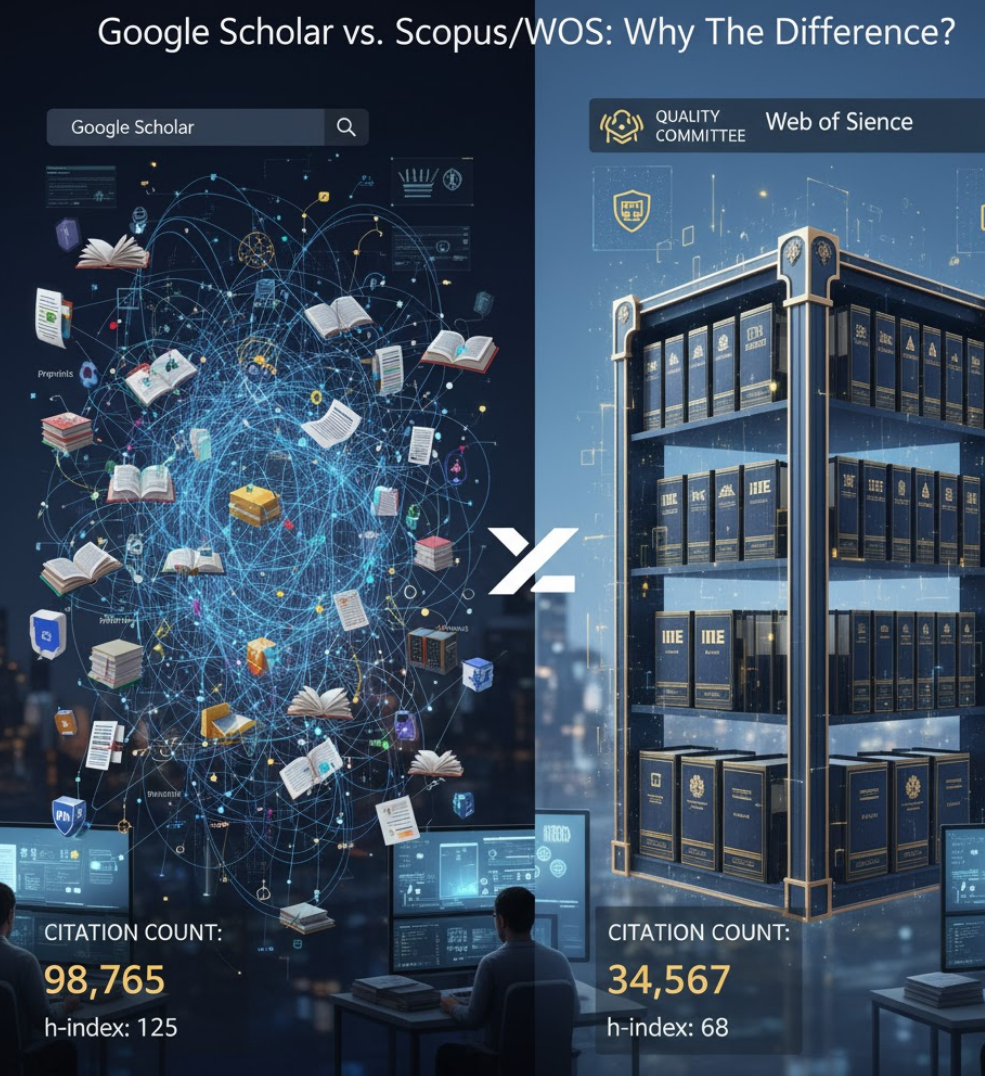

401 views||Release time: Nov 12, 2025
For nearly every researcher, a quick comparison of their publication profiles reveals a significant discrepancy: the citation count on Google Scholar is often dramatically higher than the count on Scopus or Web of Science (WOS). This is not an error; it is a fundamental design difference.
Understanding why these numbers differ is essential for accurately reporting your academic impact for grants, promotions, or performance reviews.
Here is a side-by-side comparison, followed by a detailed explanation of what drives the difference.

| Feature | Google Scholar | Scopus & Web of Science (WOS) |
| Core Philosophy | Search Engine (Inclusive) | Curated Database (Selective) |
| What is Indexed? | Everything its crawler finds: journals, conference papers, preprints (arXiv), theses, dissertations, books, technical reports, presentation slides, patents. | A selective list of high-quality, peer-reviewed journals, book series, and major conference proceedings that meet strict inclusion criteria. |
| Quality Control | Automated (algorithmic). Prone to errors, "ghost citations," and duplication. | Human-led. Journals are vetted by an expert board before being included. This is a much cleaner, more accurate (but smaller) dataset. |
| Update Speed | Fast. Can index a preprint or "in-press" article and its citations within days or weeks. | Slower. Must wait for the final, published version of an article in an indexed journal. This can create a 6-12 month lag. |
This is the single biggest factor.
Google Scholar acts like its parent search engine. Its "web crawler" scans the entire academic web and tries to index everything that looks like a scholarly work. It does not judge the quality of the source.
Scopus (Elsevier) and WOS (Clarivate) act like exclusive libraries. A journal or conference must apply to be included. This application is reviewed by an independent board of experts who judge its peer-review process, publication ethics, and academic rigor.
Result: A citation from a student's thesis, a non-peer-reviewed conference paper, or an arXiv preprint will count on Google Scholar but will not count on Scopus/WOS (unless that thesis or preprint is later cited by a journal that is indexed in Scopus/WOS).
Because Google Scholar indexes more document types, it naturally finds more citations.
Computer Science & Engineering: These fields rely heavily on conference proceedings and preprints (like arXiv). Google Scholar is excellent at tracking these, so a computer scientist's h-index and citation count will be significantly higher on Google Scholar. Scopus and WOS index far fewer conference proceedings.
Humanities & Social Sciences: These fields rely on books and book chapters. Google Scholar is much better at indexing books, leading to higher counts. Scopus and WOS are heavily biased toward journal articles.
Google Scholar's automated, algorithmic approach is prone to errors.
Mis-parsed References: Google's algorithm may misread a reference list and create a "ghost citation" to an incorrect paper.
Self-Citations: It can sometimes incorrectly attribute citations, or it may struggle to differentiate between authors with the same name.
Duplicates: It often "double-counts" citations from a preprint and the final journal version before eventually merging them, which can temporarily inflate counts.
Scopus and WOS have much cleaner, more structured data, resulting in fewer (though not zero) errors.
Neither platform is "better" or "worse"—they serve different purposes.
Use Google Scholar for: A broad, fast overview of your total impact, including non-traditional sources. It is excellent for tracking your influence in fast-moving fields (like CS) and for finding citations in books and reports.
Use Scopus / WOS for: Formal, official reporting. Most universities, grant applications, and promotion committees will only accept citation metrics from Scopus or WOS. This is considered the "official" record of peer-reviewed impact.
Conclusion: It is perfectly normal and expected for your Google Scholar citations to be much higher. The two numbers measure two different things: total web impact (GS) vs. curated peer-reviewed impact (Scopus/WOS).